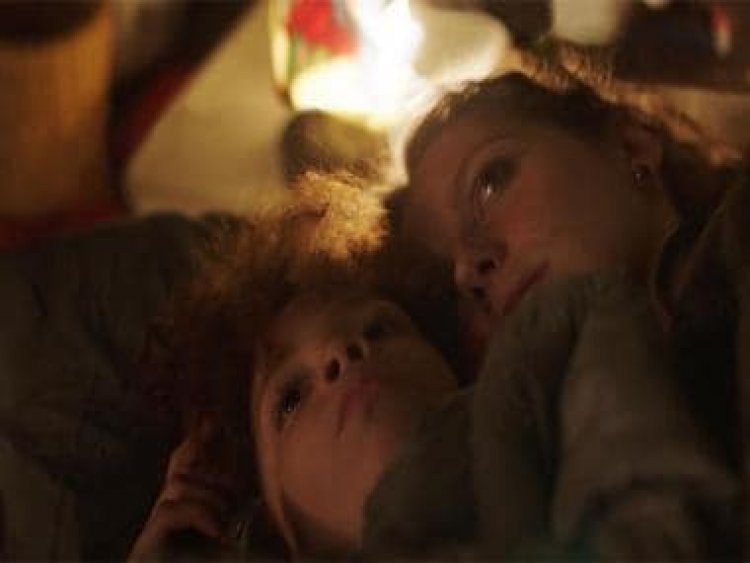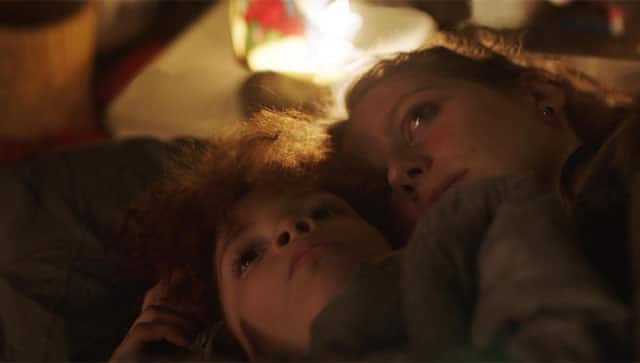First Take: Mothers & missing daughters
First Take: Mothers & missing daughters

There is something about the writer-director duo Celine Held and Logan George’s Topside, which qualifies it as an instant classic. Something anguished urgent and very disturbing, something that is at once cinematic and documentary-like. Quite frequently the shaky camera movements seem to remind us that cinema is not about aesthetics but about capturing reality as closely as possible.
That’s what Topshot does as 5-year old Little and her mother flee from destitution to an imagined freedom that is never quite obtainable for people who live below the poverty line. Little and her mother Nikki (played with stunning physical and emotional currency by co-director Celina Held) live in an abandoned tunnel of New York.

Nikki is not fit to be a mother. But a mother is all that Nikki wants to be. Celine Held brings to her drug-addicted bruised battered exploited and insolvent role that kind of desperate urgency to escape that leaves no room for pity. Watching Nikki trying to protect her lovely bewildered daughter from the hard sunlight and drugged predators on the bustling uncaring streets of New York, I thought of all the destitute people whom we pass by without even looking at them.
Where will Nikki go with her child? For more than 90 minutes, that question will haunt the audience as the co-directors weave in and out a traffic of a terrifying jostle. Watching Nikki, all jumpy and stricken with anxiety, trying to find a place for her child to sleep for the night I was willy-nilly reminded of Chetan Anand’s Hindi film Aakhri Khat (1966) in which a little boy looks for his mother in an uncaring city.
In Topside, the mother is with her child. But there is nothing she can do to protect it. The most heart-stopping moments in the storytelling occur when Nikki stumbles into a metro compartment; before her child can follow her inside the door closes. The horrific panic of the mother as she travels to the next station , runs down to another platform to catch the train back to where her daughter got left behind and where hopefully the child will be found, has been captured in real time.
You can see this is exploitative suspense. Or as a petrifying manifestation of every mother’s worst nightmare. I choose to go with the latter. Survival stories are largely swathed in the satin of a fictional glow. Topside goes the other way. It assumes a ramrod urgency pounding into our belief that screen heroes, no matter how mired in distress, will find their way to the top of the crisis. This tormented mom knows she is fighting a losing a battle. Her final decision about her child’s future will shake and stun you, but it will also remind you that letting go is the highest level of love.
I was clean-bowled by Topside. Its jittery, dizzying camerawork (Lowell A. Meyer) may leave the audience feeling queasy. But this immersive drama doesn’t deserve a detached viewing. It sucks you right into its dilemma of homelessness, as the bereft mother and daughter try to find one comforting corner in the city that they can call their own for one night.
It’s not that Nikki and Little do not encounter kindness in the city. They do. It’s just that beyond a point, kindness is not enough for survival.
The Justice Of Bunny King is a shatteringly potent look at insolvency. Not all the needy in the world, especially in this environment of post-lockdown financial crisis, want us to help them. Bunny King, played with disquieting rawness by Australian actress Essie Davis, is desperately destitute. But I doubt she would accept my helping hand if I were to offer it. There is a pungent pride in Bunny’s attitude that won’t be compromised, no matter how low she dips in the dredges of destiny. Essie Davis is so brutally honest in playing the characters she will make you wince .

The Justice Of Bunny King, now streaming on Amazon, is one of those heroine-led dramas that would probably fall apart without its central performance. The lead performance is the life and breath of this muted angry drama of seeking to create your own justice system in a world that constantly judges you by the sheen of you nail varnish and the heels of you shoes. Essie Davis is so basic in her portrayal, she persuades her co-actors to match. Some of them barely do. But no one lets down the central performance.
No one, except the screenwriter Sophie Henderson, who seeks a cinematic closure to Bunny’s wretched predicament. I don’t think Bunny would approve of the wooden-horse heroism that grips Bunny’s life in the last 40-45 minutes when she holes up in a social workers’ office. Very soon the empathetic social worker (Tanea Heke, struggling to keep her character’s overwhelming virtuosity above water) becomes Bunny’s buddy in the game of cat-and-mouse in this drama of the doomed and desperate.
I would go as far as to say that the film turns lachrymose in its closing interlude. Perhaps debutant director Gaysorn Thavat was under pressure to soften the blows that Bunny suffers. But holding up the Establishment to get her way is not something Bunny would do. She is done beating her head against the wall. Bunny King is a woman who has stopped looking for answers for why life has laid out lemons for her. She is done making lemonade. She will fight tooth and nail to get her mentally troubled little daughter out of the clutches of social workers who judge her adversely in everything she does. There is a parallel fight going on in Bunny’s life where she needs to rescue her teenaged niece Tonya (Thomasin McKenzie) from those closest to her. As though fighting her own battles is not enough! Bunny King is that kind of righteous do-righter who has nothing to lose. She will go down fighting. But dammit, she won’t hold up a social worker to get her daughter over for a birthday celebration. This is not the Bunny King we know.
In Liz Garbus’ Lost Girls on Netflix, much of this true-life harrowing story of a distraught mother’s search for a daughter who goes missing in Long Island, feels like documented evidence dipped and dried in pools of dehydrated melodrama. The plot as it uncovers the death of several young women buried in the hushed upperclass wealth of Long Island, has the potential to knock our socks off. Tragically , as the law enforcement lets the mother down, this film too is not a really worthy look-see at a crime that shook America in 2010 when a young woman Shannan Gilbert disappeared.

The cops’ antipathy apparently has to do with the missing girl being a sex worker. As a sardonic cop says somewhere during the investigation that’s opened up by the persistent mother, “I’ve never seen so much time being wasted on a hooker’s murder.”
Right. Hookers are best buried and forgotten. This means, in principle, that a woman who is not socially ‘up there’ deserves less justice than if a girl had disappeared from a normal workingclass family. It is a shocking moral discrepancy and one that, I’m afraid, this film seems incapable of shouldering let alone resolving. What we see is a mother’s relentless search for her daughter and how her other two daughter specially the teenager Sherry (Thomasin Mackenzie who was so memorable as the Jewish girl in Jojo Rabbit) come to terms with the fact that their missing sister was earning her bucks for ….well you you know the word that rhymes with shucks.
While director Lis Garbus does a commendable job of throwing light on an unpardonable crime cover-up, the treatment of the subject is often dry and pedantic. What could have been a haunting experience for viewers ends up as just a reasonably stirring echo of a crime and reluctant punishment that humanity must not forget. The story deserved an epic treatment. All its gets is an emotionless sapped-out drama where the tensions are entirely controlled by the principal actress Amy Ryan’s dramatic skills. Ms Ryan is just about adequate in bringing out the mother’s grief and determination. Admittedly it is not easy to feel any sympathy for a woman who lets her daughter earn though disrepute. No easy solution for life at the edges is provided in this drama of blunt edges and sharp disappointments.
There is none.
Subhash K Jha is a Patna-based film critic who has been writing about Bollywood for long enough to know the industry inside out. He tweets at @SubhashK_Jha.
Read all the Latest News, Trending News, Cricket News, Bollywood News, India News and Entertainment News here. Follow us on Facebook, Twitter and Instagram.
What's Your Reaction?

























































